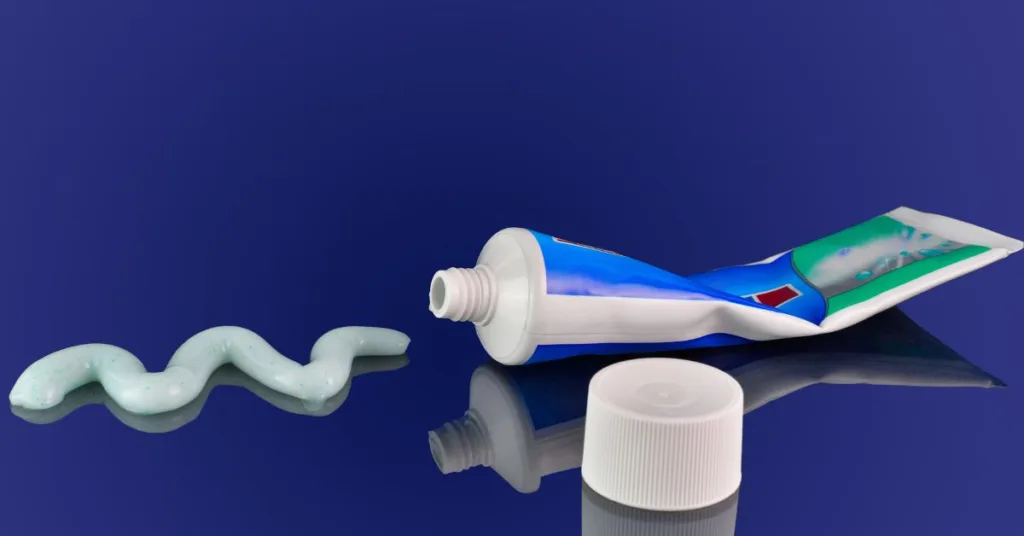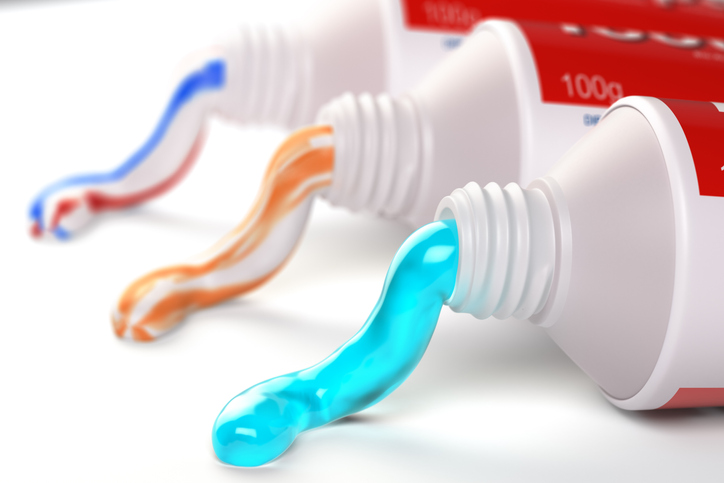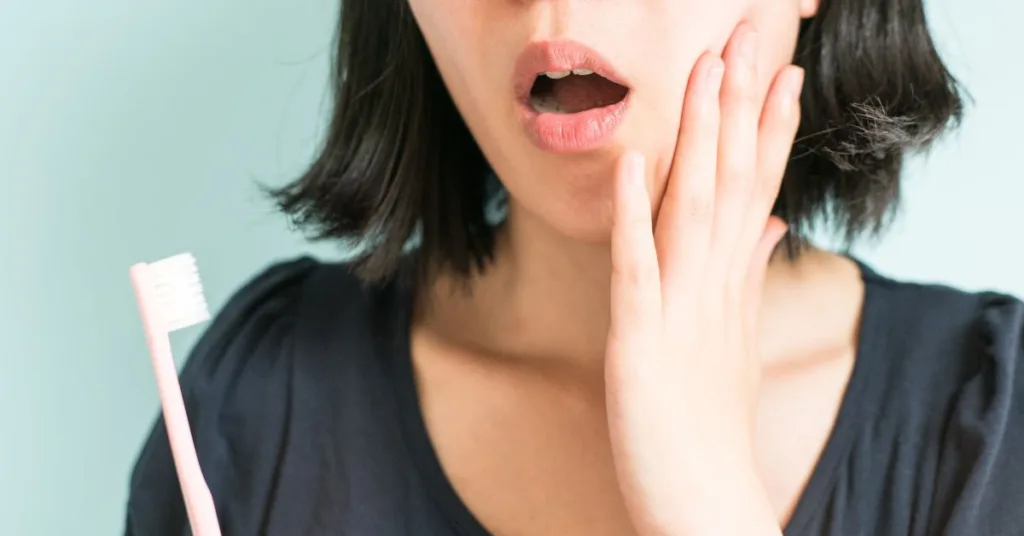Fluoride toothpaste can cause dry mouth in some people. This is because fluoride can reduce the production of saliva. Dry mouth can lead to a number of problems, such as an increased risk of cavities and bad breath.
If you are using fluoride toothpaste and you experience dry mouth, talk to your dentist or doctor. They may recommend that you use a different type of toothpaste or take other steps to manage your dry mouth.
If you suffer from dry mouth, you may be wondering if fluoride toothpaste is to blame. While it is true that fluoride can cause dry mouth, it is not the only culprit. There are many other things that can contribute to this condition, including medications, dehydration, and medical conditions.
That said, if you find that your dry mouth gets worse after using fluoride toothpaste, it may be worth looking into other brands that are designed for people with sensitive mouths.
Fluoride Toothpaste Is A SCAM?!
What Ingredient in Toothpaste Causes Dry Mouth
There are a few different ingredients in toothpaste that can cause dry mouth. One of the most common is fluoride. Fluoride is a mineral that helps to prevent cavities and tooth decay, but it can also lead to dry mouth.
Other ingredients that can cause dry mouth include menthol, mint, and alcohol. If you have dry mouth, you may want to try a toothpaste with less of these ingredients or switch to one specifically designed for people with dry mouth.
Can Whitening Toothpaste Cause Dry Mouth
If you are prone to dry mouth, you may want to avoid using whitening toothpastes. While these types of toothpastes can be effective at brightening your teeth, they can also cause dry mouth. Dry mouth is a condition in which there is not enough saliva in the mouth.
This can lead to a number of problems, including bad breath, difficulty chewing and swallowing, and an increased risk of cavities. Whitening toothpastes usually contain chemicals that can help to break down stains on the teeth. However, these same chemicals can also reduce the production of saliva.
This can leave your mouth feeling dry and uncomfortable. If you suffer from dry mouth, it is important to keep your mouth hydrated by drinking plenty of water throughout the day. You should also avoid using products that contain alcohol or other drying agents.
And, be sure to talk to your dentist if you are concerned about the effects of whitening toothpaste on your oral health.
Sensodyne Side Effects Dry Mouth
If you suffer from dry mouth, you may be looking for a way to relieve your symptoms. One option you may have heard of is Sensodyne. But what are the side effects of Sensodyne?
Dry mouth is a common side effect of many medications and medical conditions. It can also be caused by certain lifestyle choices, such as smoking or drinking alcohol. Dry mouth can be uncomfortable and lead to other problems, such as bad breath, difficulty swallowing, and an increased risk of cavities.
Sensodyne is a toothpaste that contains fluoride and is designed for people with sensitive teeth. It can also help to reduce the symptoms of dry mouth. However, like any medication, there are potential side effects associated with its use.
These include: • Increased thirst: This is one of the most common side effects of using Sensodyne toothpaste. If you find that you are thirsty after using it, try drinking plenty of water throughout the day and avoid sugary drinks which can make your symptoms worse.
• Nausea: Some people may experience nausea after using Sensodyne toothpaste due to the minty flavorings used in the product. If this happens to you, try switching to another brand or flavor of toothpaste.
• Stomach pain: In rare cases, some people may experience stomach pain after using Sensodyne toothpaste.
If this occurs, discontinue use immediately and contact your doctor if the pain persists or worsens.
Toothpaste Causing Dry Mouth
If you suffer from dry mouth, you may be looking for ways to relieve your symptoms. One thing you may not have considered is whether your toothpaste could be causing dry mouth. There are a few different ways that toothpaste can cause dry mouth.
First, some toothpastes contain sodium lauryl sulfate (SLS), which is a foaming agent that can also act as an irritant. This ingredient can cause the tissues in your mouth to become inflamed, leading to dryness and discomfort. Another way that toothpaste can cause dry mouth is by containing high levels of fluoride.
Fluoride is important for dental health, but too much of it can actually lead to the drying out of the saliva glands. This can leave your mouth feeling parched and uncomfortable. If you suffer from dry mouth, there are special toothpastes available that are designed to help alleviate the symptoms.
These toothpastes often don’t contain SLS or fluoride, and instead, focus on ingredients that help to soothe and protect the delicate tissues in your mouth. Talk to your dentist about which type of toothpaste would be best for you.
Can Toothpaste Cause Dry Mouth at Night
If you’ve ever woken up in the middle of the night with a dry, parched mouth, you may have been tempted to reach for your toothpaste. After all, it’s right there on your bathroom counter and it contains fluoride, which is known to help keep teeth healthy. However, before you start swishing toothpaste around your mouth at night, you should be aware that it can actually cause dry mouth.
Toothpaste is abrasive and can irritate the delicate tissues in your mouth. This can lead to inflammation and reduced saliva production. Saliva is essential for keeping your mouth moist and preventing cavities.
When you reduce saliva production by using toothpaste at night, you’re more likely to wake up with a dry mouth. In addition, many toothpastes contain ingredients that can further contribute to dryness. These include alcohols, menthols, and other drying agents.
If you find that your toothpaste is causing dryness, consider switching to a brand that does not contain these ingredients. You can use coconut oil or baking soda instead.
Credit: espiredental.com
Can Your Toothpaste Cause Dry Mouth?
Most toothpastes contain fluoride, which is a natural substance that helps to protect teeth from cavities. However, some people may experience dry mouth as a side effect of using fluoride toothpaste.
Dry mouth can happen when the salivary glands don’t produce enough saliva, or if the saliva becomes too thick.
This can make it difficult to keep your mouth moist and can lead to bad breath. Fluoride can also cause staining of the teeth if used excessively.
If you’re experiencing dry mouth after using fluoride toothpaste, try switching to a brand that doesn’t contain fluoride or use a smaller amount of toothpaste on your brush.
You should also drink plenty of water throughout the day to stay hydrated. If your symptoms persist, see your dentist for further evaluation.
Does Fluoride Toothpaste Help Dry Mouth?
There are a variety of toothpastes on the market that claim to help with dry mouth, but does fluoride toothpaste really help? Let’s take a closer look. Dry mouth, also known as xerostomia, is a condition where there is not enough saliva in the mouth.
This can lead to a number of problems, such as difficulty speaking and swallowing, an increased risk for cavities and gum disease, and bad breath. While there are many potential causes of dry mouth, one of the most common is dehydration. Fluoride is a mineral that occurs naturally in water and helps to strengthen teeth and prevent cavities.
Fluoride toothpaste can be helpful for people with dry mouth because it can help to increase saliva production. In addition, fluoride can help to protect against cavities by making the teeth more resistant to acid attacks. If you are experiencing dry mouth, talk to your dentist or doctor about whether fluoride toothpaste may be right for you.
What Kind of Toothpaste is Good for Dry Mouth?
There are a number of toothpastes on the market that claim to be good for dry mouth. However, it is important to consult with your dentist before using any new product, as they will be able to advise you on which one will be best for your individual needs. Some popular brands of toothpaste that are marketed as being good for dry mouth include Biotene, CloSYS, and Colgate Dry Mouth.
These toothpastes typically contain ingredients that help to increase saliva production and/or prevent bacterial growth.
Why Does My Mouth Get Dry After Brushing My Teeth?
There are a few reasons why your mouth may feel dry after brushing your teeth. One reason is that you may be dehydrated. When you brush your teeth, it removes saliva from your mouth, which can leave your mouth feeling dry.
Drinking a glass of water after brushing your teeth can help to rehydrate your body and prevent the dry mouth feeling. Another reason for a dry mouth after brushing could be that you are using a toothpaste that is too abrasive. Some toothpastes can contain ingredients that are harsh on the delicate tissues in your mouth, causing them to become irritated and inflamed.
This can lead to a decrease in saliva production and a feeling of dryness in the mouth. If you find that your toothpaste is causing this problem, try switching to a gentler formula or one specifically designed for people with sensitive mouths. Finally, certain medications can cause dryness of the mucous membranes in the mouth as a side effect.
If you are taking any medication that has this listed as a possible side effect, talk to your doctor about other options that might better suit you.
Conclusion
While fluoride is often touted as a necessary ingredient in toothpaste, some people are concerned that it may have harmful side effects. One potential issue is dry mouth.
Saliva plays an important role in keeping the mouth healthy by washing away food and bacteria.
When saliva production is reduced, the mouth can become dry and uncomfortable. Fluoride may contribute to dry mouth by decreasing saliva production. In addition, fluoride can irritate the tissues in the mouth, leading to inflammation and pain.
If you’re concerned about fluoride causing dry mouth, there are a few things you can do. Look for toothpastes that are designed for people with sensitive teeth or gums. These products often have lower levels of fluoride.
You can also try using a different type of toothpaste or brushing your teeth with water instead of toothpaste altogether.


